Report on Legislation and Ethics in Travel and Tourism Sector UK
VerifiedAdded on 2023/04/17
|13
|3658
|362
Report
AI Summary
This report provides an overview of the legislation and ethics within the travel and tourism sector, with a focus on the UK context and referencing the Thomas Cook Group. It covers health, safety, and security principles, equality acts, and contract law, emphasizing the importance of compliance for maintaining customer relationships and ethical standards. The report also addresses ethical dilemmas faced by the tourism sector, such as managing costs and cultural diversity. It highlights the impact of these factors on organizational performance, employee motivation, and the overall development of the tourism industry, while pointing out potential negative consequences of non-compliance.
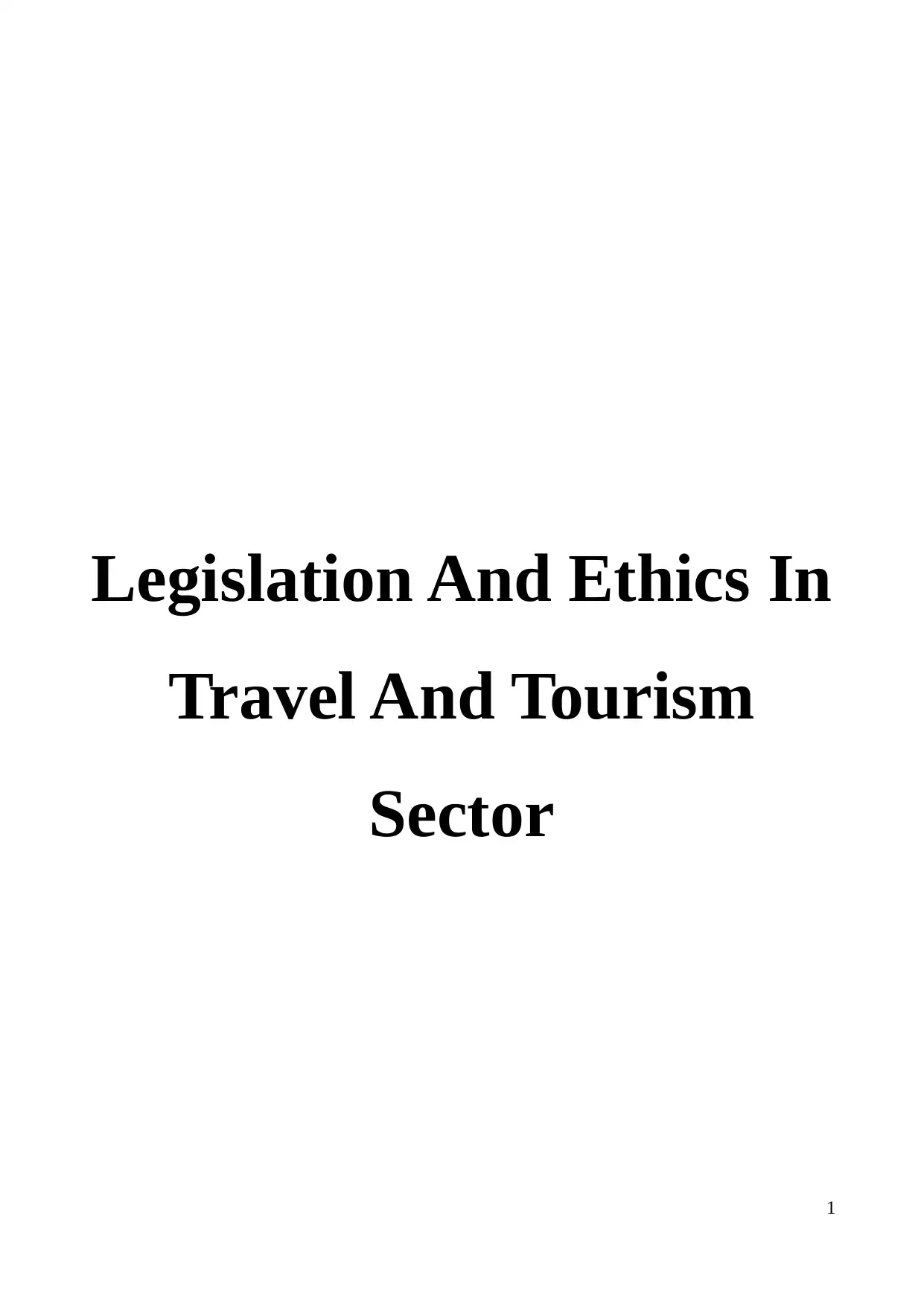
Legislation And Ethics In
Travel And Tourism
Sector
1
Travel And Tourism
Sector
1
Paraphrase This Document
Need a fresh take? Get an instant paraphrase of this document with our AI Paraphraser
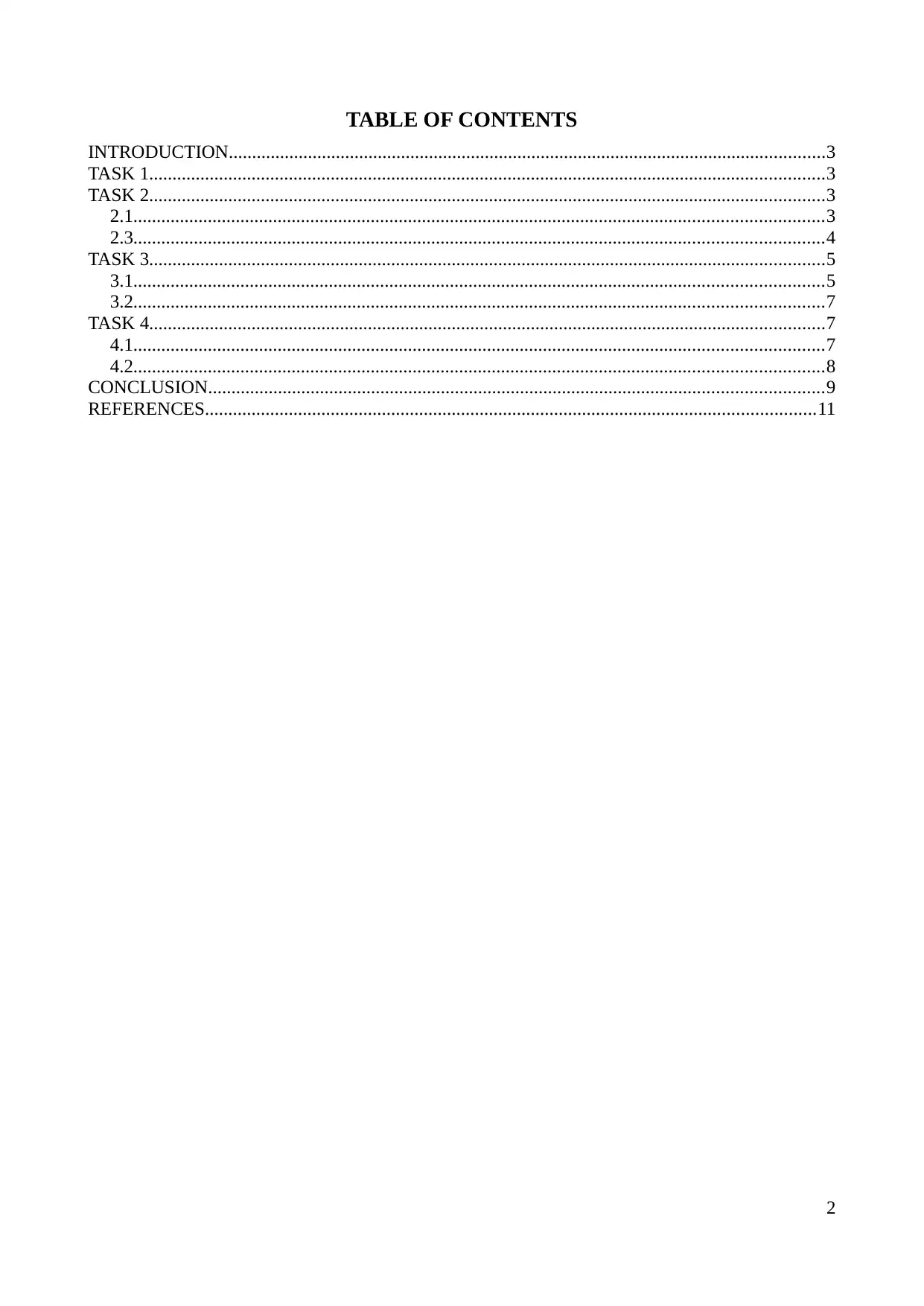
TABLE OF CONTENTS
INTRODUCTION................................................................................................................................3
TASK 1.................................................................................................................................................3
TASK 2.................................................................................................................................................3
2.1....................................................................................................................................................3
2.3....................................................................................................................................................4
TASK 3.................................................................................................................................................5
3.1....................................................................................................................................................5
3.2....................................................................................................................................................7
TASK 4.................................................................................................................................................7
4.1....................................................................................................................................................7
4.2....................................................................................................................................................8
CONCLUSION....................................................................................................................................9
REFERENCES...................................................................................................................................11
2
INTRODUCTION................................................................................................................................3
TASK 1.................................................................................................................................................3
TASK 2.................................................................................................................................................3
2.1....................................................................................................................................................3
2.3....................................................................................................................................................4
TASK 3.................................................................................................................................................5
3.1....................................................................................................................................................5
3.2....................................................................................................................................................7
TASK 4.................................................................................................................................................7
4.1....................................................................................................................................................7
4.2....................................................................................................................................................8
CONCLUSION....................................................................................................................................9
REFERENCES...................................................................................................................................11
2
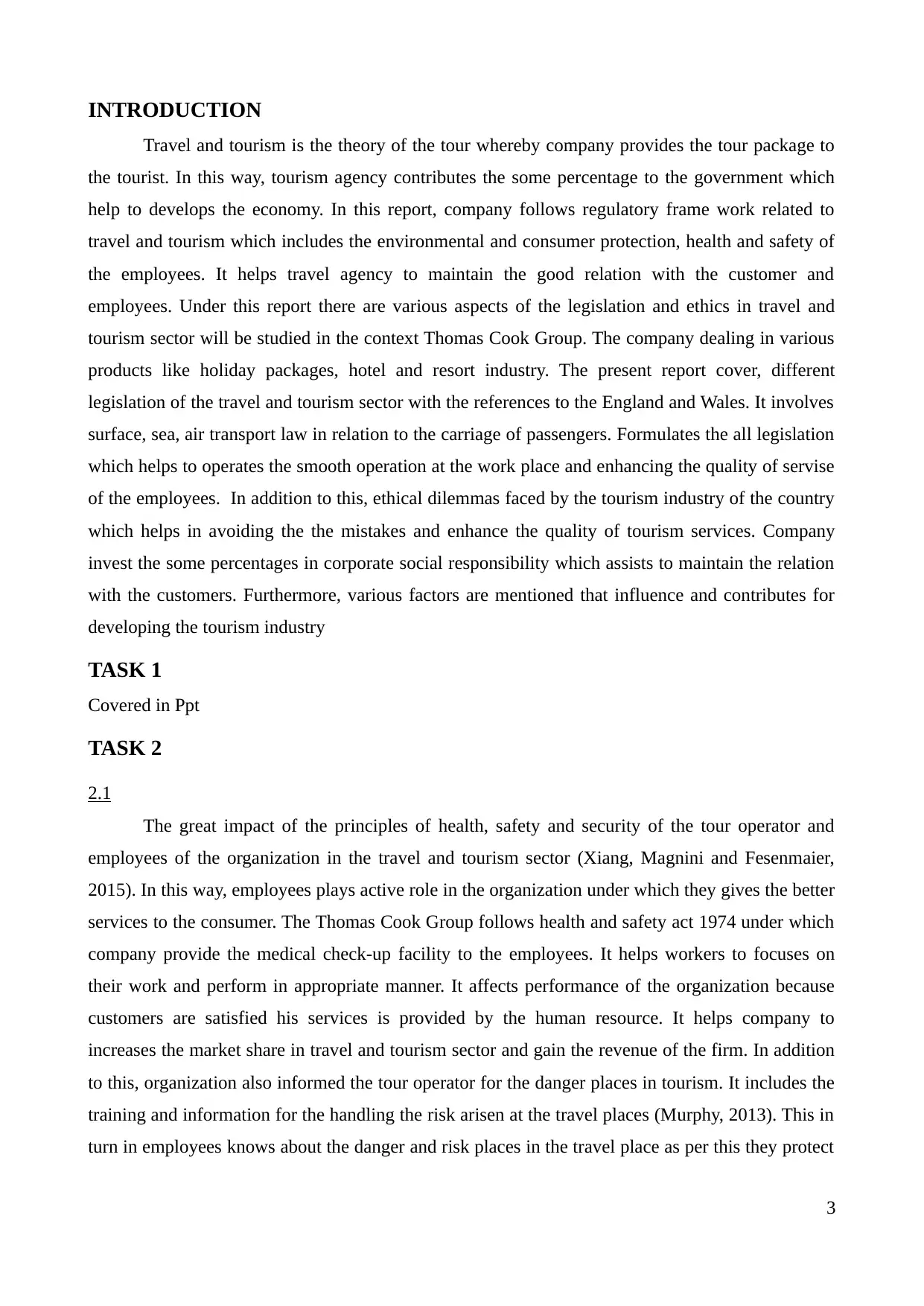
INTRODUCTION
Travel and tourism is the theory of the tour whereby company provides the tour package to
the tourist. In this way, tourism agency contributes the some percentage to the government which
help to develops the economy. In this report, company follows regulatory frame work related to
travel and tourism which includes the environmental and consumer protection, health and safety of
the employees. It helps travel agency to maintain the good relation with the customer and
employees. Under this report there are various aspects of the legislation and ethics in travel and
tourism sector will be studied in the context Thomas Cook Group. The company dealing in various
products like holiday packages, hotel and resort industry. The present report cover, different
legislation of the travel and tourism sector with the references to the England and Wales. It involves
surface, sea, air transport law in relation to the carriage of passengers. Formulates the all legislation
which helps to operates the smooth operation at the work place and enhancing the quality of servise
of the employees. In addition to this, ethical dilemmas faced by the tourism industry of the country
which helps in avoiding the the mistakes and enhance the quality of tourism services. Company
invest the some percentages in corporate social responsibility which assists to maintain the relation
with the customers. Furthermore, various factors are mentioned that influence and contributes for
developing the tourism industry
TASK 1
Covered in Ppt
TASK 2
2.1
The great impact of the principles of health, safety and security of the tour operator and
employees of the organization in the travel and tourism sector (Xiang, Magnini and Fesenmaier,
2015). In this way, employees plays active role in the organization under which they gives the better
services to the consumer. The Thomas Cook Group follows health and safety act 1974 under which
company provide the medical check-up facility to the employees. It helps workers to focuses on
their work and perform in appropriate manner. It affects performance of the organization because
customers are satisfied his services is provided by the human resource. It helps company to
increases the market share in travel and tourism sector and gain the revenue of the firm. In addition
to this, organization also informed the tour operator for the danger places in tourism. It includes the
training and information for the handling the risk arisen at the travel places (Murphy, 2013). This in
turn in employees knows about the danger and risk places in the travel place as per this they protect
3
Travel and tourism is the theory of the tour whereby company provides the tour package to
the tourist. In this way, tourism agency contributes the some percentage to the government which
help to develops the economy. In this report, company follows regulatory frame work related to
travel and tourism which includes the environmental and consumer protection, health and safety of
the employees. It helps travel agency to maintain the good relation with the customer and
employees. Under this report there are various aspects of the legislation and ethics in travel and
tourism sector will be studied in the context Thomas Cook Group. The company dealing in various
products like holiday packages, hotel and resort industry. The present report cover, different
legislation of the travel and tourism sector with the references to the England and Wales. It involves
surface, sea, air transport law in relation to the carriage of passengers. Formulates the all legislation
which helps to operates the smooth operation at the work place and enhancing the quality of servise
of the employees. In addition to this, ethical dilemmas faced by the tourism industry of the country
which helps in avoiding the the mistakes and enhance the quality of tourism services. Company
invest the some percentages in corporate social responsibility which assists to maintain the relation
with the customers. Furthermore, various factors are mentioned that influence and contributes for
developing the tourism industry
TASK 1
Covered in Ppt
TASK 2
2.1
The great impact of the principles of health, safety and security of the tour operator and
employees of the organization in the travel and tourism sector (Xiang, Magnini and Fesenmaier,
2015). In this way, employees plays active role in the organization under which they gives the better
services to the consumer. The Thomas Cook Group follows health and safety act 1974 under which
company provide the medical check-up facility to the employees. It helps workers to focuses on
their work and perform in appropriate manner. It affects performance of the organization because
customers are satisfied his services is provided by the human resource. It helps company to
increases the market share in travel and tourism sector and gain the revenue of the firm. In addition
to this, organization also informed the tour operator for the danger places in tourism. It includes the
training and information for the handling the risk arisen at the travel places (Murphy, 2013). This in
turn in employees knows about the danger and risk places in the travel place as per this they protect
3
⊘ This is a preview!⊘
Do you want full access?
Subscribe today to unlock all pages.

Trusted by 1+ million students worldwide
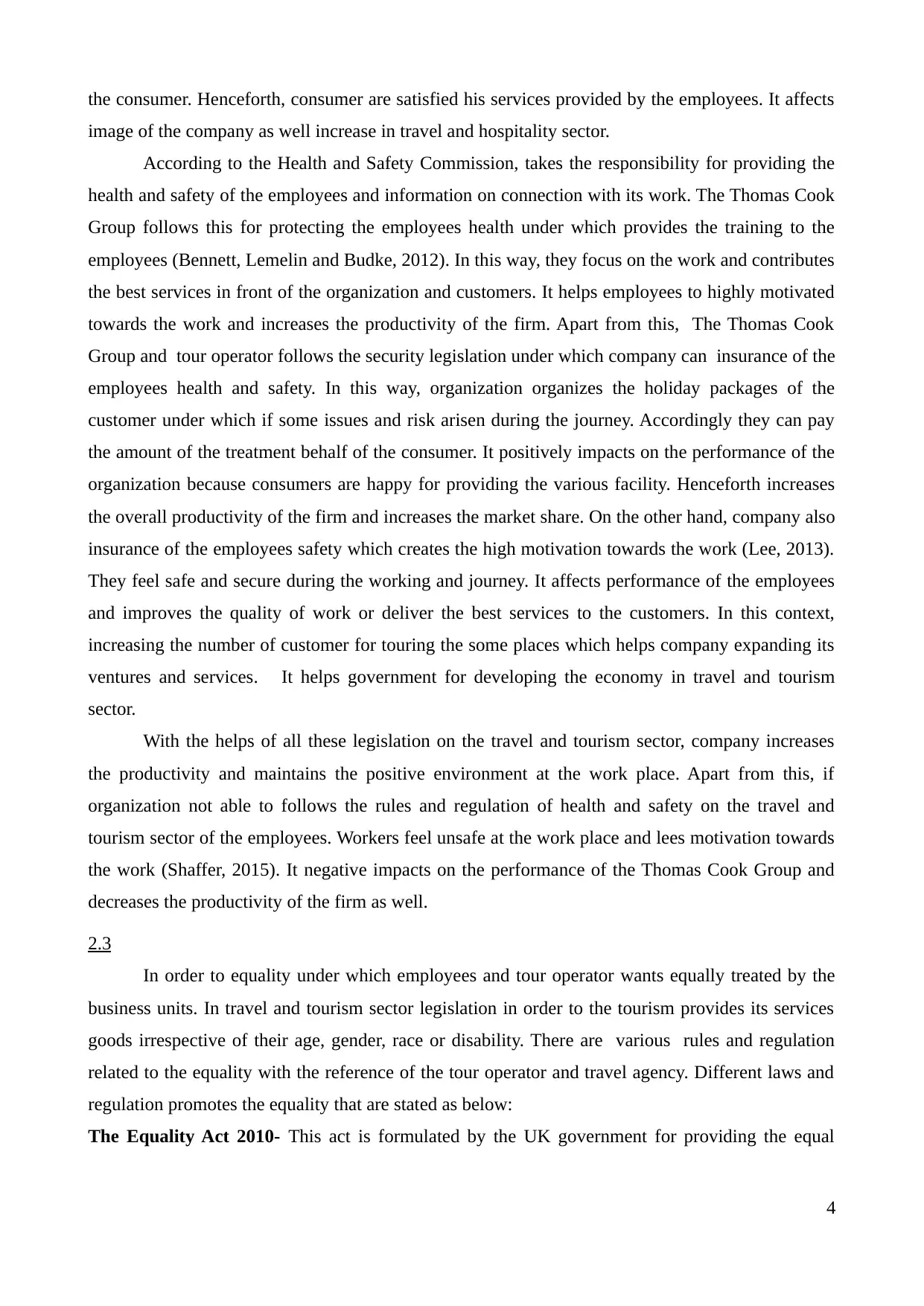
the consumer. Henceforth, consumer are satisfied his services provided by the employees. It affects
image of the company as well increase in travel and hospitality sector.
According to the Health and Safety Commission, takes the responsibility for providing the
health and safety of the employees and information on connection with its work. The Thomas Cook
Group follows this for protecting the employees health under which provides the training to the
employees (Bennett, Lemelin and Budke, 2012). In this way, they focus on the work and contributes
the best services in front of the organization and customers. It helps employees to highly motivated
towards the work and increases the productivity of the firm. Apart from this, The Thomas Cook
Group and tour operator follows the security legislation under which company can insurance of the
employees health and safety. In this way, organization organizes the holiday packages of the
customer under which if some issues and risk arisen during the journey. Accordingly they can pay
the amount of the treatment behalf of the consumer. It positively impacts on the performance of the
organization because consumers are happy for providing the various facility. Henceforth increases
the overall productivity of the firm and increases the market share. On the other hand, company also
insurance of the employees safety which creates the high motivation towards the work (Lee, 2013).
They feel safe and secure during the working and journey. It affects performance of the employees
and improves the quality of work or deliver the best services to the customers. In this context,
increasing the number of customer for touring the some places which helps company expanding its
ventures and services. It helps government for developing the economy in travel and tourism
sector.
With the helps of all these legislation on the travel and tourism sector, company increases
the productivity and maintains the positive environment at the work place. Apart from this, if
organization not able to follows the rules and regulation of health and safety on the travel and
tourism sector of the employees. Workers feel unsafe at the work place and lees motivation towards
the work (Shaffer, 2015). It negative impacts on the performance of the Thomas Cook Group and
decreases the productivity of the firm as well.
2.3
In order to equality under which employees and tour operator wants equally treated by the
business units. In travel and tourism sector legislation in order to the tourism provides its services
goods irrespective of their age, gender, race or disability. There are various rules and regulation
related to the equality with the reference of the tour operator and travel agency. Different laws and
regulation promotes the equality that are stated as below:
The Equality Act 2010- This act is formulated by the UK government for providing the equal
4
image of the company as well increase in travel and hospitality sector.
According to the Health and Safety Commission, takes the responsibility for providing the
health and safety of the employees and information on connection with its work. The Thomas Cook
Group follows this for protecting the employees health under which provides the training to the
employees (Bennett, Lemelin and Budke, 2012). In this way, they focus on the work and contributes
the best services in front of the organization and customers. It helps employees to highly motivated
towards the work and increases the productivity of the firm. Apart from this, The Thomas Cook
Group and tour operator follows the security legislation under which company can insurance of the
employees health and safety. In this way, organization organizes the holiday packages of the
customer under which if some issues and risk arisen during the journey. Accordingly they can pay
the amount of the treatment behalf of the consumer. It positively impacts on the performance of the
organization because consumers are happy for providing the various facility. Henceforth increases
the overall productivity of the firm and increases the market share. On the other hand, company also
insurance of the employees safety which creates the high motivation towards the work (Lee, 2013).
They feel safe and secure during the working and journey. It affects performance of the employees
and improves the quality of work or deliver the best services to the customers. In this context,
increasing the number of customer for touring the some places which helps company expanding its
ventures and services. It helps government for developing the economy in travel and tourism
sector.
With the helps of all these legislation on the travel and tourism sector, company increases
the productivity and maintains the positive environment at the work place. Apart from this, if
organization not able to follows the rules and regulation of health and safety on the travel and
tourism sector of the employees. Workers feel unsafe at the work place and lees motivation towards
the work (Shaffer, 2015). It negative impacts on the performance of the Thomas Cook Group and
decreases the productivity of the firm as well.
2.3
In order to equality under which employees and tour operator wants equally treated by the
business units. In travel and tourism sector legislation in order to the tourism provides its services
goods irrespective of their age, gender, race or disability. There are various rules and regulation
related to the equality with the reference of the tour operator and travel agency. Different laws and
regulation promotes the equality that are stated as below:
The Equality Act 2010- This act is formulated by the UK government for providing the equal
4
Paraphrase This Document
Need a fresh take? Get an instant paraphrase of this document with our AI Paraphraser
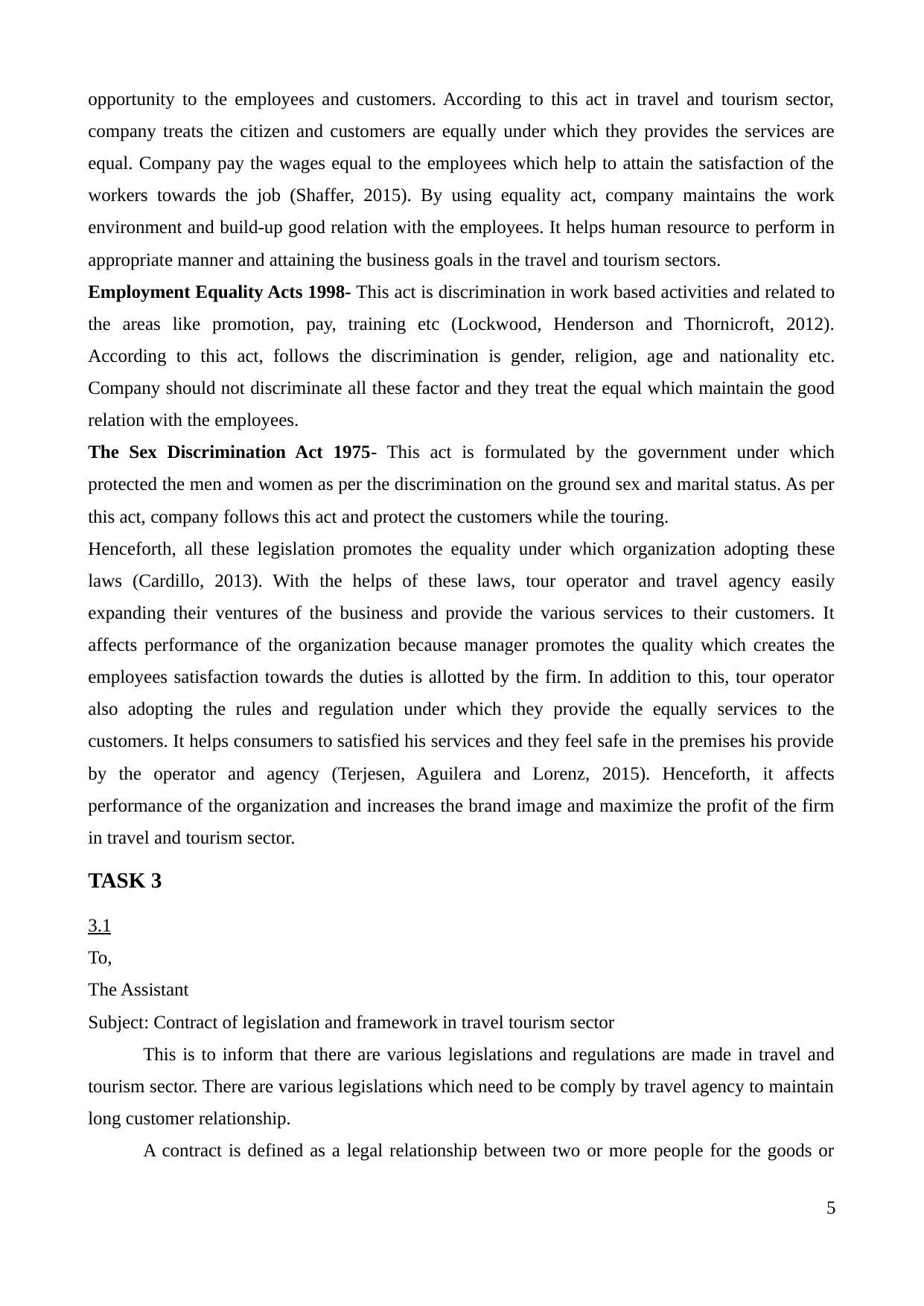
opportunity to the employees and customers. According to this act in travel and tourism sector,
company treats the citizen and customers are equally under which they provides the services are
equal. Company pay the wages equal to the employees which help to attain the satisfaction of the
workers towards the job (Shaffer, 2015). By using equality act, company maintains the work
environment and build-up good relation with the employees. It helps human resource to perform in
appropriate manner and attaining the business goals in the travel and tourism sectors.
Employment Equality Acts 1998- This act is discrimination in work based activities and related to
the areas like promotion, pay, training etc (Lockwood, Henderson and Thornicroft, 2012).
According to this act, follows the discrimination is gender, religion, age and nationality etc.
Company should not discriminate all these factor and they treat the equal which maintain the good
relation with the employees.
The Sex Discrimination Act 1975- This act is formulated by the government under which
protected the men and women as per the discrimination on the ground sex and marital status. As per
this act, company follows this act and protect the customers while the touring.
Henceforth, all these legislation promotes the equality under which organization adopting these
laws (Cardillo, 2013). With the helps of these laws, tour operator and travel agency easily
expanding their ventures of the business and provide the various services to their customers. It
affects performance of the organization because manager promotes the quality which creates the
employees satisfaction towards the duties is allotted by the firm. In addition to this, tour operator
also adopting the rules and regulation under which they provide the equally services to the
customers. It helps consumers to satisfied his services and they feel safe in the premises his provide
by the operator and agency (Terjesen, Aguilera and Lorenz, 2015). Henceforth, it affects
performance of the organization and increases the brand image and maximize the profit of the firm
in travel and tourism sector.
TASK 3
3.1
To,
The Assistant
Subject: Contract of legislation and framework in travel tourism sector
This is to inform that there are various legislations and regulations are made in travel and
tourism sector. There are various legislations which need to be comply by travel agency to maintain
long customer relationship.
A contract is defined as a legal relationship between two or more people for the goods or
5
company treats the citizen and customers are equally under which they provides the services are
equal. Company pay the wages equal to the employees which help to attain the satisfaction of the
workers towards the job (Shaffer, 2015). By using equality act, company maintains the work
environment and build-up good relation with the employees. It helps human resource to perform in
appropriate manner and attaining the business goals in the travel and tourism sectors.
Employment Equality Acts 1998- This act is discrimination in work based activities and related to
the areas like promotion, pay, training etc (Lockwood, Henderson and Thornicroft, 2012).
According to this act, follows the discrimination is gender, religion, age and nationality etc.
Company should not discriminate all these factor and they treat the equal which maintain the good
relation with the employees.
The Sex Discrimination Act 1975- This act is formulated by the government under which
protected the men and women as per the discrimination on the ground sex and marital status. As per
this act, company follows this act and protect the customers while the touring.
Henceforth, all these legislation promotes the equality under which organization adopting these
laws (Cardillo, 2013). With the helps of these laws, tour operator and travel agency easily
expanding their ventures of the business and provide the various services to their customers. It
affects performance of the organization because manager promotes the quality which creates the
employees satisfaction towards the duties is allotted by the firm. In addition to this, tour operator
also adopting the rules and regulation under which they provide the equally services to the
customers. It helps consumers to satisfied his services and they feel safe in the premises his provide
by the operator and agency (Terjesen, Aguilera and Lorenz, 2015). Henceforth, it affects
performance of the organization and increases the brand image and maximize the profit of the firm
in travel and tourism sector.
TASK 3
3.1
To,
The Assistant
Subject: Contract of legislation and framework in travel tourism sector
This is to inform that there are various legislations and regulations are made in travel and
tourism sector. There are various legislations which need to be comply by travel agency to maintain
long customer relationship.
A contract is defined as a legal relationship between two or more people for the goods or
5
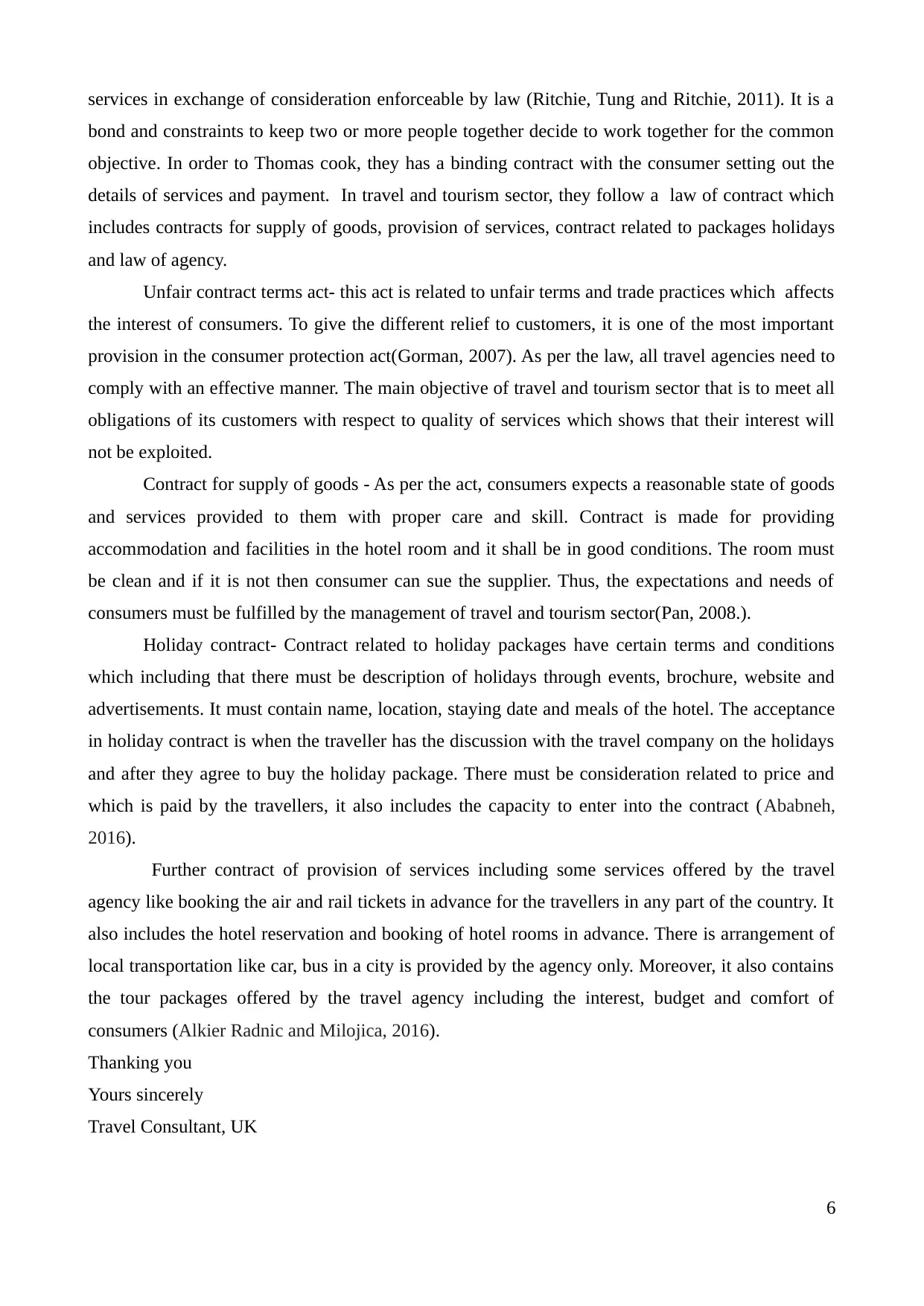
services in exchange of consideration enforceable by law (Ritchie, Tung and Ritchie, 2011). It is a
bond and constraints to keep two or more people together decide to work together for the common
objective. In order to Thomas cook, they has a binding contract with the consumer setting out the
details of services and payment. In travel and tourism sector, they follow a law of contract which
includes contracts for supply of goods, provision of services, contract related to packages holidays
and law of agency.
Unfair contract terms act- this act is related to unfair terms and trade practices which affects
the interest of consumers. To give the different relief to customers, it is one of the most important
provision in the consumer protection act(Gorman, 2007). As per the law, all travel agencies need to
comply with an effective manner. The main objective of travel and tourism sector that is to meet all
obligations of its customers with respect to quality of services which shows that their interest will
not be exploited.
Contract for supply of goods - As per the act, consumers expects a reasonable state of goods
and services provided to them with proper care and skill. Contract is made for providing
accommodation and facilities in the hotel room and it shall be in good conditions. The room must
be clean and if it is not then consumer can sue the supplier. Thus, the expectations and needs of
consumers must be fulfilled by the management of travel and tourism sector(Pan, 2008.).
Holiday contract- Contract related to holiday packages have certain terms and conditions
which including that there must be description of holidays through events, brochure, website and
advertisements. It must contain name, location, staying date and meals of the hotel. The acceptance
in holiday contract is when the traveller has the discussion with the travel company on the holidays
and after they agree to buy the holiday package. There must be consideration related to price and
which is paid by the travellers, it also includes the capacity to enter into the contract (Ababneh,
2016).
Further contract of provision of services including some services offered by the travel
agency like booking the air and rail tickets in advance for the travellers in any part of the country. It
also includes the hotel reservation and booking of hotel rooms in advance. There is arrangement of
local transportation like car, bus in a city is provided by the agency only. Moreover, it also contains
the tour packages offered by the travel agency including the interest, budget and comfort of
consumers (Alkier Radnic and Milojica, 2016).
Thanking you
Yours sincerely
Travel Consultant, UK
6
bond and constraints to keep two or more people together decide to work together for the common
objective. In order to Thomas cook, they has a binding contract with the consumer setting out the
details of services and payment. In travel and tourism sector, they follow a law of contract which
includes contracts for supply of goods, provision of services, contract related to packages holidays
and law of agency.
Unfair contract terms act- this act is related to unfair terms and trade practices which affects
the interest of consumers. To give the different relief to customers, it is one of the most important
provision in the consumer protection act(Gorman, 2007). As per the law, all travel agencies need to
comply with an effective manner. The main objective of travel and tourism sector that is to meet all
obligations of its customers with respect to quality of services which shows that their interest will
not be exploited.
Contract for supply of goods - As per the act, consumers expects a reasonable state of goods
and services provided to them with proper care and skill. Contract is made for providing
accommodation and facilities in the hotel room and it shall be in good conditions. The room must
be clean and if it is not then consumer can sue the supplier. Thus, the expectations and needs of
consumers must be fulfilled by the management of travel and tourism sector(Pan, 2008.).
Holiday contract- Contract related to holiday packages have certain terms and conditions
which including that there must be description of holidays through events, brochure, website and
advertisements. It must contain name, location, staying date and meals of the hotel. The acceptance
in holiday contract is when the traveller has the discussion with the travel company on the holidays
and after they agree to buy the holiday package. There must be consideration related to price and
which is paid by the travellers, it also includes the capacity to enter into the contract (Ababneh,
2016).
Further contract of provision of services including some services offered by the travel
agency like booking the air and rail tickets in advance for the travellers in any part of the country. It
also includes the hotel reservation and booking of hotel rooms in advance. There is arrangement of
local transportation like car, bus in a city is provided by the agency only. Moreover, it also contains
the tour packages offered by the travel agency including the interest, budget and comfort of
consumers (Alkier Radnic and Milojica, 2016).
Thanking you
Yours sincerely
Travel Consultant, UK
6
⊘ This is a preview!⊘
Do you want full access?
Subscribe today to unlock all pages.

Trusted by 1+ million students worldwide
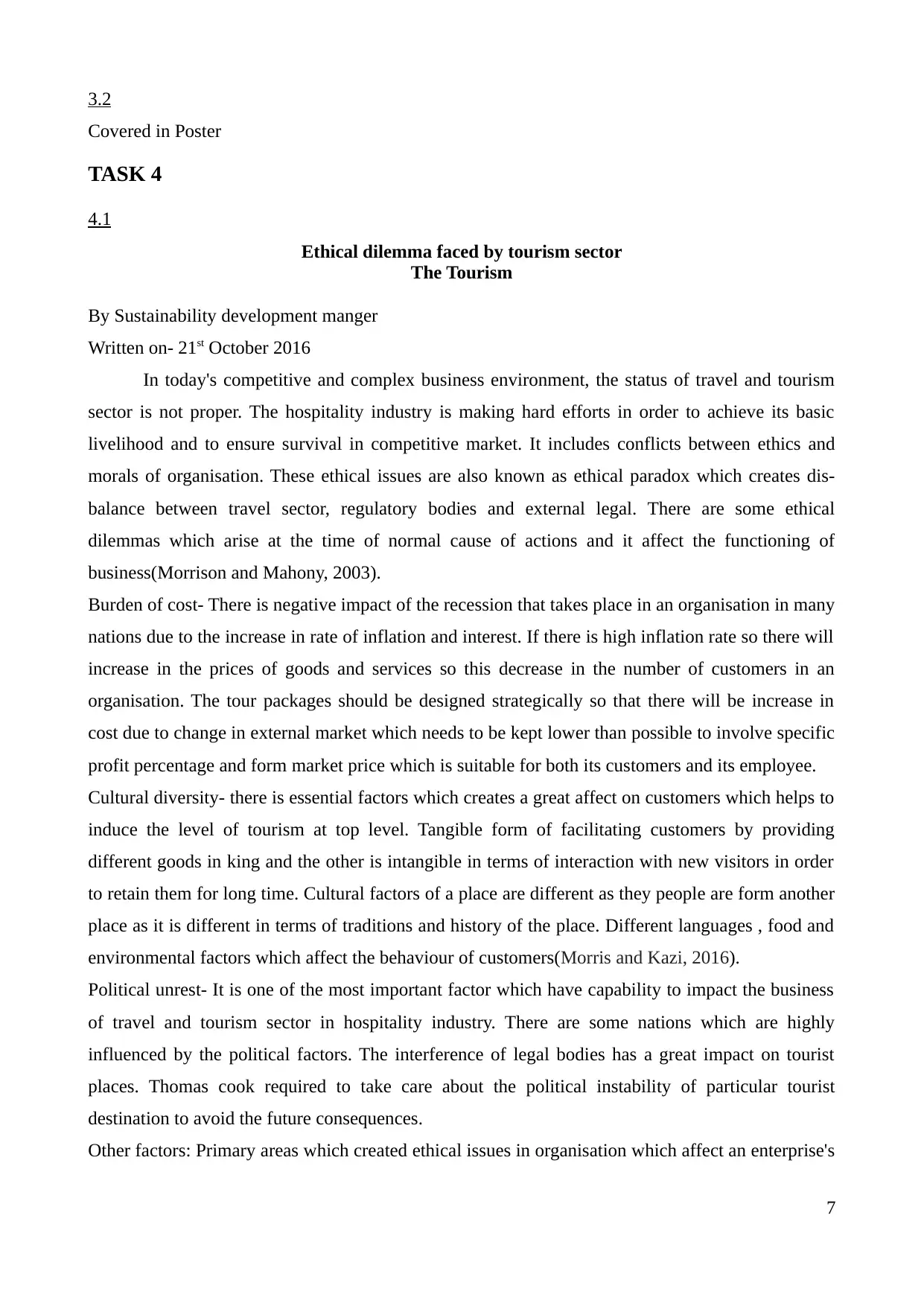
3.2
Covered in Poster
TASK 4
4.1
Ethical dilemma faced by tourism sector
The Tourism
By Sustainability development manger
Written on- 21st October 2016
In today's competitive and complex business environment, the status of travel and tourism
sector is not proper. The hospitality industry is making hard efforts in order to achieve its basic
livelihood and to ensure survival in competitive market. It includes conflicts between ethics and
morals of organisation. These ethical issues are also known as ethical paradox which creates dis-
balance between travel sector, regulatory bodies and external legal. There are some ethical
dilemmas which arise at the time of normal cause of actions and it affect the functioning of
business(Morrison and Mahony, 2003).
Burden of cost- There is negative impact of the recession that takes place in an organisation in many
nations due to the increase in rate of inflation and interest. If there is high inflation rate so there will
increase in the prices of goods and services so this decrease in the number of customers in an
organisation. The tour packages should be designed strategically so that there will be increase in
cost due to change in external market which needs to be kept lower than possible to involve specific
profit percentage and form market price which is suitable for both its customers and its employee.
Cultural diversity- there is essential factors which creates a great affect on customers which helps to
induce the level of tourism at top level. Tangible form of facilitating customers by providing
different goods in king and the other is intangible in terms of interaction with new visitors in order
to retain them for long time. Cultural factors of a place are different as they people are form another
place as it is different in terms of traditions and history of the place. Different languages , food and
environmental factors which affect the behaviour of customers(Morris and Kazi, 2016).
Political unrest- It is one of the most important factor which have capability to impact the business
of travel and tourism sector in hospitality industry. There are some nations which are highly
influenced by the political factors. The interference of legal bodies has a great impact on tourist
places. Thomas cook required to take care about the political instability of particular tourist
destination to avoid the future consequences.
Other factors: Primary areas which created ethical issues in organisation which affect an enterprise's
7
Covered in Poster
TASK 4
4.1
Ethical dilemma faced by tourism sector
The Tourism
By Sustainability development manger
Written on- 21st October 2016
In today's competitive and complex business environment, the status of travel and tourism
sector is not proper. The hospitality industry is making hard efforts in order to achieve its basic
livelihood and to ensure survival in competitive market. It includes conflicts between ethics and
morals of organisation. These ethical issues are also known as ethical paradox which creates dis-
balance between travel sector, regulatory bodies and external legal. There are some ethical
dilemmas which arise at the time of normal cause of actions and it affect the functioning of
business(Morrison and Mahony, 2003).
Burden of cost- There is negative impact of the recession that takes place in an organisation in many
nations due to the increase in rate of inflation and interest. If there is high inflation rate so there will
increase in the prices of goods and services so this decrease in the number of customers in an
organisation. The tour packages should be designed strategically so that there will be increase in
cost due to change in external market which needs to be kept lower than possible to involve specific
profit percentage and form market price which is suitable for both its customers and its employee.
Cultural diversity- there is essential factors which creates a great affect on customers which helps to
induce the level of tourism at top level. Tangible form of facilitating customers by providing
different goods in king and the other is intangible in terms of interaction with new visitors in order
to retain them for long time. Cultural factors of a place are different as they people are form another
place as it is different in terms of traditions and history of the place. Different languages , food and
environmental factors which affect the behaviour of customers(Morris and Kazi, 2016).
Political unrest- It is one of the most important factor which have capability to impact the business
of travel and tourism sector in hospitality industry. There are some nations which are highly
influenced by the political factors. The interference of legal bodies has a great impact on tourist
places. Thomas cook required to take care about the political instability of particular tourist
destination to avoid the future consequences.
Other factors: Primary areas which created ethical issues in organisation which affect an enterprise's
7
Paraphrase This Document
Need a fresh take? Get an instant paraphrase of this document with our AI Paraphraser
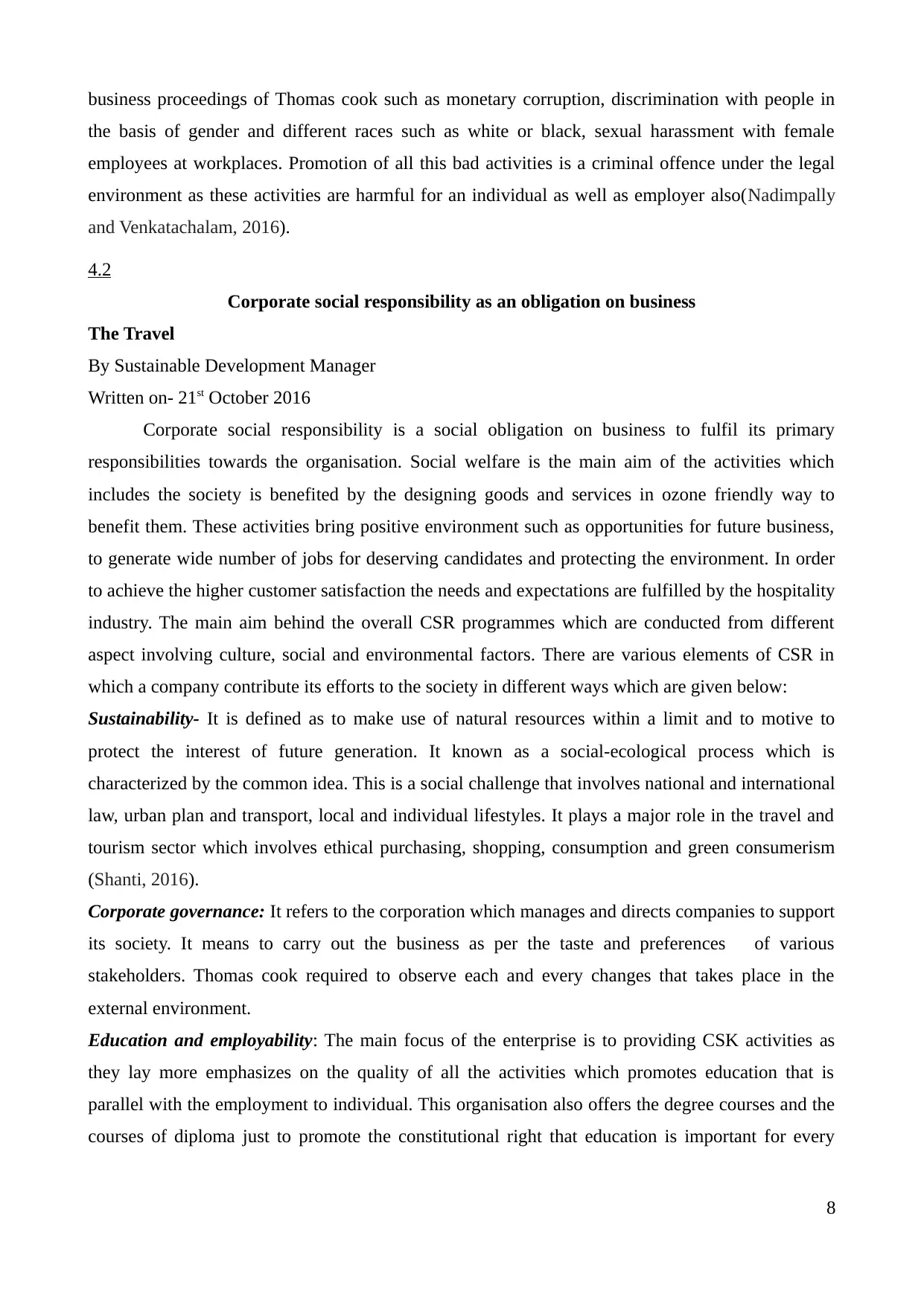
business proceedings of Thomas cook such as monetary corruption, discrimination with people in
the basis of gender and different races such as white or black, sexual harassment with female
employees at workplaces. Promotion of all this bad activities is a criminal offence under the legal
environment as these activities are harmful for an individual as well as employer also(Nadimpally
and Venkatachalam, 2016).
4.2
Corporate social responsibility as an obligation on business
The Travel
By Sustainable Development Manager
Written on- 21st October 2016
Corporate social responsibility is a social obligation on business to fulfil its primary
responsibilities towards the organisation. Social welfare is the main aim of the activities which
includes the society is benefited by the designing goods and services in ozone friendly way to
benefit them. These activities bring positive environment such as opportunities for future business,
to generate wide number of jobs for deserving candidates and protecting the environment. In order
to achieve the higher customer satisfaction the needs and expectations are fulfilled by the hospitality
industry. The main aim behind the overall CSR programmes which are conducted from different
aspect involving culture, social and environmental factors. There are various elements of CSR in
which a company contribute its efforts to the society in different ways which are given below:
Sustainability- It is defined as to make use of natural resources within a limit and to motive to
protect the interest of future generation. It known as a social-ecological process which is
characterized by the common idea. This is a social challenge that involves national and international
law, urban plan and transport, local and individual lifestyles. It plays a major role in the travel and
tourism sector which involves ethical purchasing, shopping, consumption and green consumerism
(Shanti, 2016).
Corporate governance: It refers to the corporation which manages and directs companies to support
its society. It means to carry out the business as per the taste and preferences of various
stakeholders. Thomas cook required to observe each and every changes that takes place in the
external environment.
Education and employability: The main focus of the enterprise is to providing CSK activities as
they lay more emphasizes on the quality of all the activities which promotes education that is
parallel with the employment to individual. This organisation also offers the degree courses and the
courses of diploma just to promote the constitutional right that education is important for every
8
the basis of gender and different races such as white or black, sexual harassment with female
employees at workplaces. Promotion of all this bad activities is a criminal offence under the legal
environment as these activities are harmful for an individual as well as employer also(Nadimpally
and Venkatachalam, 2016).
4.2
Corporate social responsibility as an obligation on business
The Travel
By Sustainable Development Manager
Written on- 21st October 2016
Corporate social responsibility is a social obligation on business to fulfil its primary
responsibilities towards the organisation. Social welfare is the main aim of the activities which
includes the society is benefited by the designing goods and services in ozone friendly way to
benefit them. These activities bring positive environment such as opportunities for future business,
to generate wide number of jobs for deserving candidates and protecting the environment. In order
to achieve the higher customer satisfaction the needs and expectations are fulfilled by the hospitality
industry. The main aim behind the overall CSR programmes which are conducted from different
aspect involving culture, social and environmental factors. There are various elements of CSR in
which a company contribute its efforts to the society in different ways which are given below:
Sustainability- It is defined as to make use of natural resources within a limit and to motive to
protect the interest of future generation. It known as a social-ecological process which is
characterized by the common idea. This is a social challenge that involves national and international
law, urban plan and transport, local and individual lifestyles. It plays a major role in the travel and
tourism sector which involves ethical purchasing, shopping, consumption and green consumerism
(Shanti, 2016).
Corporate governance: It refers to the corporation which manages and directs companies to support
its society. It means to carry out the business as per the taste and preferences of various
stakeholders. Thomas cook required to observe each and every changes that takes place in the
external environment.
Education and employability: The main focus of the enterprise is to providing CSK activities as
they lay more emphasizes on the quality of all the activities which promotes education that is
parallel with the employment to individual. This organisation also offers the degree courses and the
courses of diploma just to promote the constitutional right that education is important for every
8
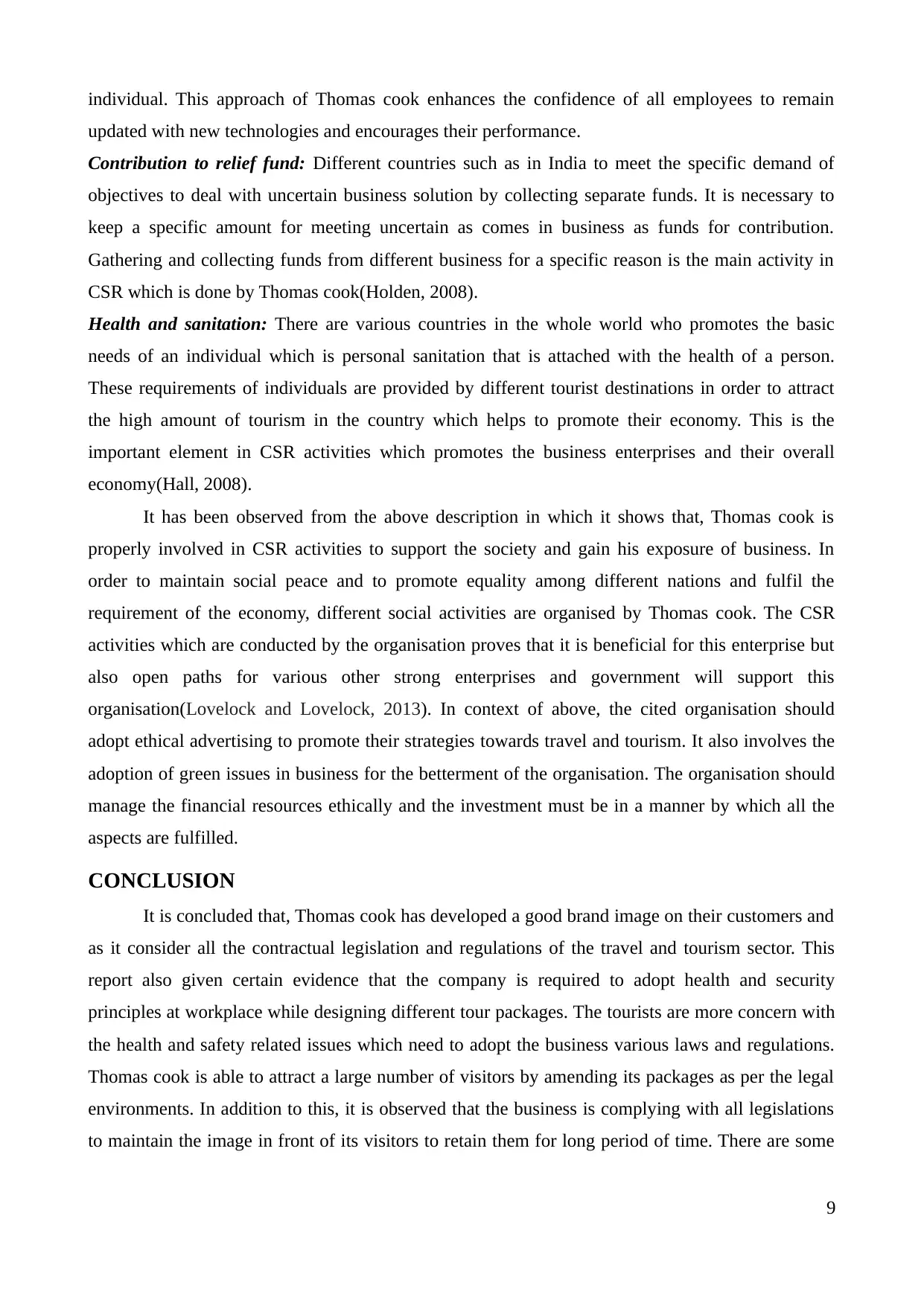
individual. This approach of Thomas cook enhances the confidence of all employees to remain
updated with new technologies and encourages their performance.
Contribution to relief fund: Different countries such as in India to meet the specific demand of
objectives to deal with uncertain business solution by collecting separate funds. It is necessary to
keep a specific amount for meeting uncertain as comes in business as funds for contribution.
Gathering and collecting funds from different business for a specific reason is the main activity in
CSR which is done by Thomas cook(Holden, 2008).
Health and sanitation: There are various countries in the whole world who promotes the basic
needs of an individual which is personal sanitation that is attached with the health of a person.
These requirements of individuals are provided by different tourist destinations in order to attract
the high amount of tourism in the country which helps to promote their economy. This is the
important element in CSR activities which promotes the business enterprises and their overall
economy(Hall, 2008).
It has been observed from the above description in which it shows that, Thomas cook is
properly involved in CSR activities to support the society and gain his exposure of business. In
order to maintain social peace and to promote equality among different nations and fulfil the
requirement of the economy, different social activities are organised by Thomas cook. The CSR
activities which are conducted by the organisation proves that it is beneficial for this enterprise but
also open paths for various other strong enterprises and government will support this
organisation(Lovelock and Lovelock, 2013). In context of above, the cited organisation should
adopt ethical advertising to promote their strategies towards travel and tourism. It also involves the
adoption of green issues in business for the betterment of the organisation. The organisation should
manage the financial resources ethically and the investment must be in a manner by which all the
aspects are fulfilled.
CONCLUSION
It is concluded that, Thomas cook has developed a good brand image on their customers and
as it consider all the contractual legislation and regulations of the travel and tourism sector. This
report also given certain evidence that the company is required to adopt health and security
principles at workplace while designing different tour packages. The tourists are more concern with
the health and safety related issues which need to adopt the business various laws and regulations.
Thomas cook is able to attract a large number of visitors by amending its packages as per the legal
environments. In addition to this, it is observed that the business is complying with all legislations
to maintain the image in front of its visitors to retain them for long period of time. There are some
9
updated with new technologies and encourages their performance.
Contribution to relief fund: Different countries such as in India to meet the specific demand of
objectives to deal with uncertain business solution by collecting separate funds. It is necessary to
keep a specific amount for meeting uncertain as comes in business as funds for contribution.
Gathering and collecting funds from different business for a specific reason is the main activity in
CSR which is done by Thomas cook(Holden, 2008).
Health and sanitation: There are various countries in the whole world who promotes the basic
needs of an individual which is personal sanitation that is attached with the health of a person.
These requirements of individuals are provided by different tourist destinations in order to attract
the high amount of tourism in the country which helps to promote their economy. This is the
important element in CSR activities which promotes the business enterprises and their overall
economy(Hall, 2008).
It has been observed from the above description in which it shows that, Thomas cook is
properly involved in CSR activities to support the society and gain his exposure of business. In
order to maintain social peace and to promote equality among different nations and fulfil the
requirement of the economy, different social activities are organised by Thomas cook. The CSR
activities which are conducted by the organisation proves that it is beneficial for this enterprise but
also open paths for various other strong enterprises and government will support this
organisation(Lovelock and Lovelock, 2013). In context of above, the cited organisation should
adopt ethical advertising to promote their strategies towards travel and tourism. It also involves the
adoption of green issues in business for the betterment of the organisation. The organisation should
manage the financial resources ethically and the investment must be in a manner by which all the
aspects are fulfilled.
CONCLUSION
It is concluded that, Thomas cook has developed a good brand image on their customers and
as it consider all the contractual legislation and regulations of the travel and tourism sector. This
report also given certain evidence that the company is required to adopt health and security
principles at workplace while designing different tour packages. The tourists are more concern with
the health and safety related issues which need to adopt the business various laws and regulations.
Thomas cook is able to attract a large number of visitors by amending its packages as per the legal
environments. In addition to this, it is observed that the business is complying with all legislations
to maintain the image in front of its visitors to retain them for long period of time. There are some
9
⊘ This is a preview!⊘
Do you want full access?
Subscribe today to unlock all pages.

Trusted by 1+ million students worldwide
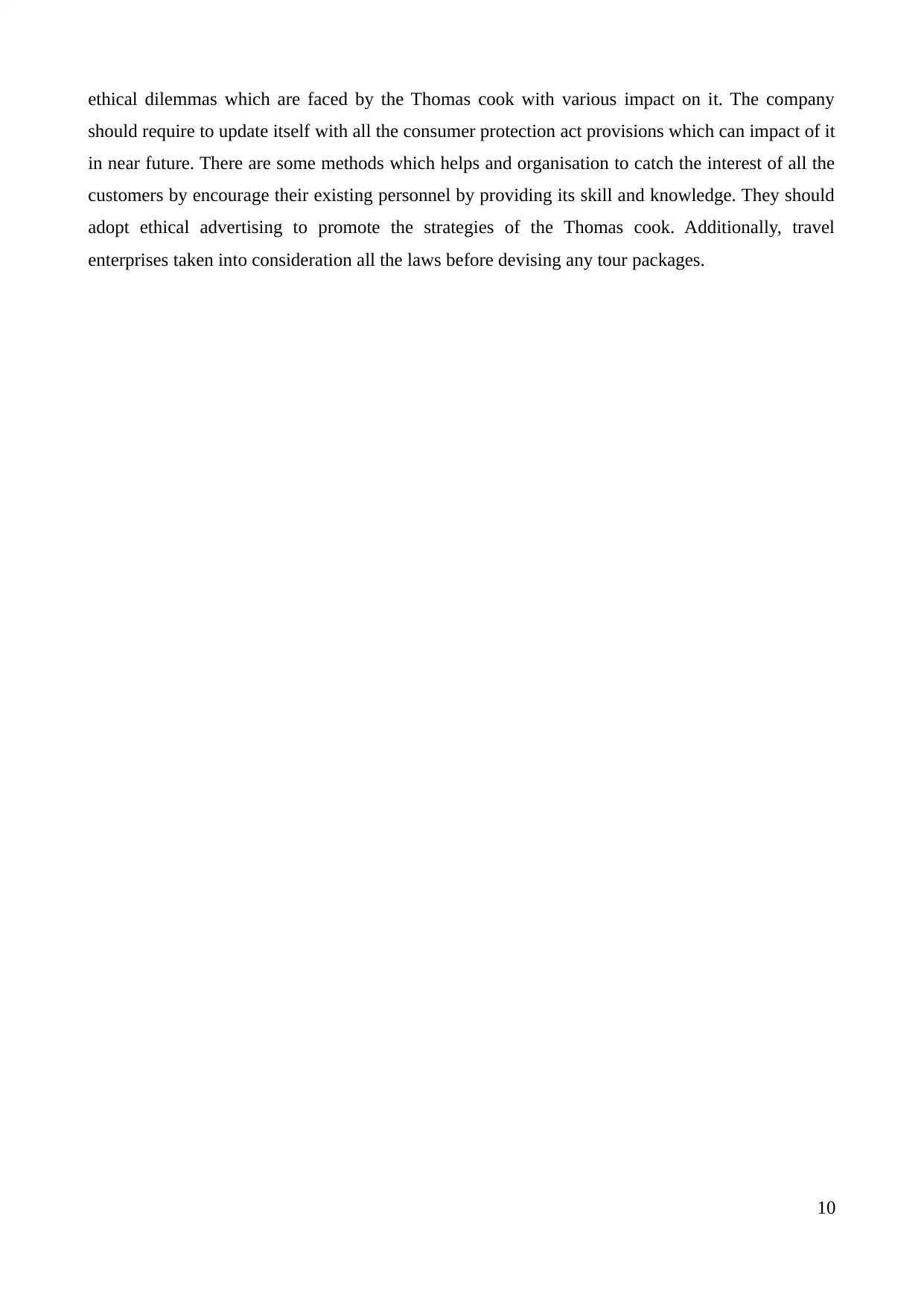
ethical dilemmas which are faced by the Thomas cook with various impact on it. The company
should require to update itself with all the consumer protection act provisions which can impact of it
in near future. There are some methods which helps and organisation to catch the interest of all the
customers by encourage their existing personnel by providing its skill and knowledge. They should
adopt ethical advertising to promote the strategies of the Thomas cook. Additionally, travel
enterprises taken into consideration all the laws before devising any tour packages.
10
should require to update itself with all the consumer protection act provisions which can impact of it
in near future. There are some methods which helps and organisation to catch the interest of all the
customers by encourage their existing personnel by providing its skill and knowledge. They should
adopt ethical advertising to promote the strategies of the Thomas cook. Additionally, travel
enterprises taken into consideration all the laws before devising any tour packages.
10
Paraphrase This Document
Need a fresh take? Get an instant paraphrase of this document with our AI Paraphraser
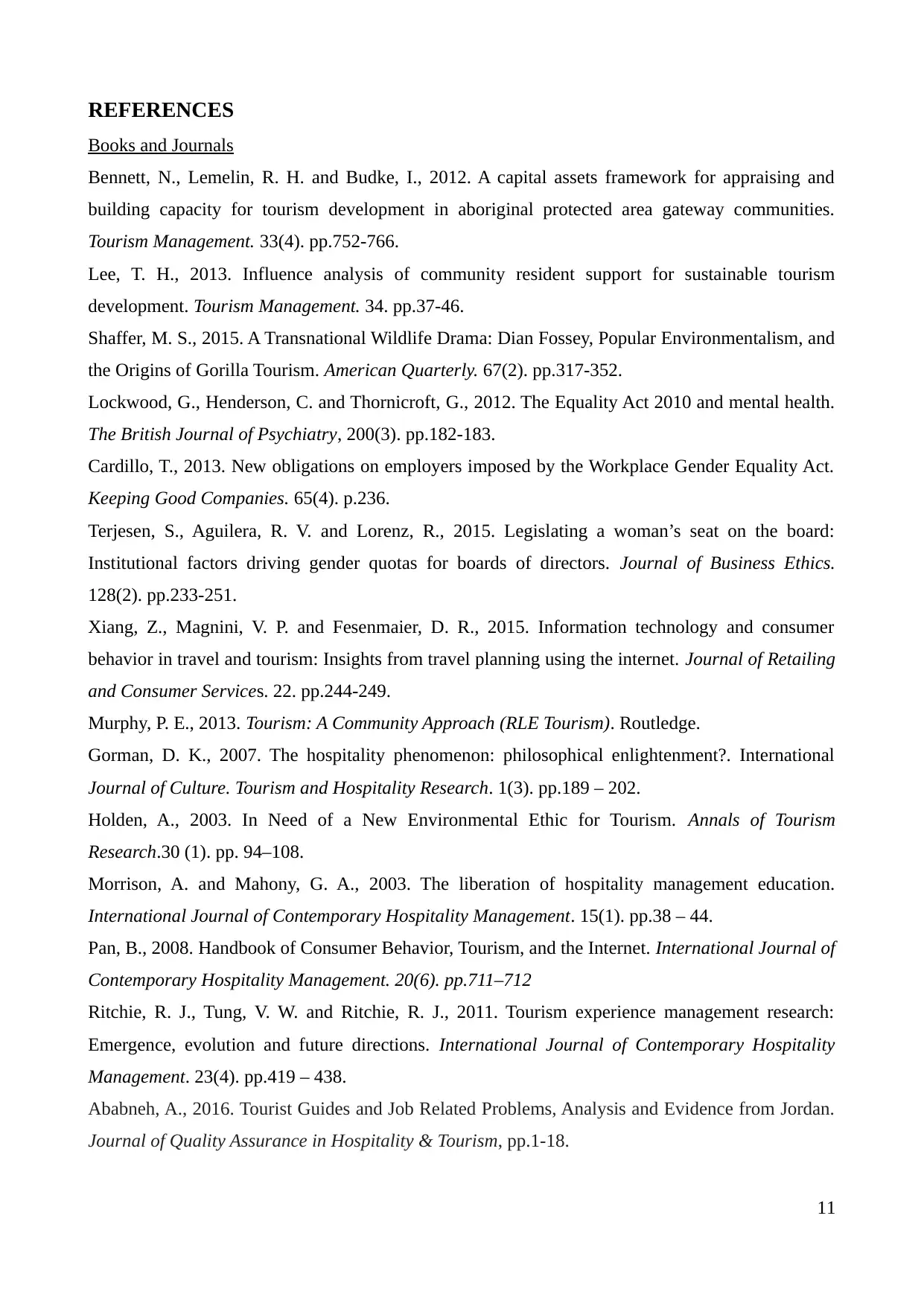
REFERENCES
Books and Journals
Bennett, N., Lemelin, R. H. and Budke, I., 2012. A capital assets framework for appraising and
building capacity for tourism development in aboriginal protected area gateway communities.
Tourism Management. 33(4). pp.752-766.
Lee, T. H., 2013. Influence analysis of community resident support for sustainable tourism
development. Tourism Management. 34. pp.37-46.
Shaffer, M. S., 2015. A Transnational Wildlife Drama: Dian Fossey, Popular Environmentalism, and
the Origins of Gorilla Tourism. American Quarterly. 67(2). pp.317-352.
Lockwood, G., Henderson, C. and Thornicroft, G., 2012. The Equality Act 2010 and mental health.
The British Journal of Psychiatry, 200(3). pp.182-183.
Cardillo, T., 2013. New obligations on employers imposed by the Workplace Gender Equality Act.
Keeping Good Companies. 65(4). p.236.
Terjesen, S., Aguilera, R. V. and Lorenz, R., 2015. Legislating a woman’s seat on the board:
Institutional factors driving gender quotas for boards of directors. Journal of Business Ethics.
128(2). pp.233-251.
Xiang, Z., Magnini, V. P. and Fesenmaier, D. R., 2015. Information technology and consumer
behavior in travel and tourism: Insights from travel planning using the internet. Journal of Retailing
and Consumer Services. 22. pp.244-249.
Murphy, P. E., 2013. Tourism: A Community Approach (RLE Tourism). Routledge.
Gorman, D. K., 2007. The hospitality phenomenon: philosophical enlightenment?. International
Journal of Culture. Tourism and Hospitality Research. 1(3). pp.189 – 202.
Holden, A., 2003. In Need of a New Environmental Ethic for Tourism. Annals of Tourism
Research.30 (1). pp. 94–108.
Morrison, A. and Mahony, G. A., 2003. The liberation of hospitality management education.
International Journal of Contemporary Hospitality Management. 15(1). pp.38 – 44.
Pan, B., 2008. Handbook of Consumer Behavior, Tourism, and the Internet. International Journal of
Contemporary Hospitality Management. 20(6). pp.711–712
Ritchie, R. J., Tung, V. W. and Ritchie, R. J., 2011. Tourism experience management research:
Emergence, evolution and future directions. International Journal of Contemporary Hospitality
Management. 23(4). pp.419 – 438.
Ababneh, A., 2016. Tourist Guides and Job Related Problems, Analysis and Evidence from Jordan.
Journal of Quality Assurance in Hospitality & Tourism, pp.1-18.
11
Books and Journals
Bennett, N., Lemelin, R. H. and Budke, I., 2012. A capital assets framework for appraising and
building capacity for tourism development in aboriginal protected area gateway communities.
Tourism Management. 33(4). pp.752-766.
Lee, T. H., 2013. Influence analysis of community resident support for sustainable tourism
development. Tourism Management. 34. pp.37-46.
Shaffer, M. S., 2015. A Transnational Wildlife Drama: Dian Fossey, Popular Environmentalism, and
the Origins of Gorilla Tourism. American Quarterly. 67(2). pp.317-352.
Lockwood, G., Henderson, C. and Thornicroft, G., 2012. The Equality Act 2010 and mental health.
The British Journal of Psychiatry, 200(3). pp.182-183.
Cardillo, T., 2013. New obligations on employers imposed by the Workplace Gender Equality Act.
Keeping Good Companies. 65(4). p.236.
Terjesen, S., Aguilera, R. V. and Lorenz, R., 2015. Legislating a woman’s seat on the board:
Institutional factors driving gender quotas for boards of directors. Journal of Business Ethics.
128(2). pp.233-251.
Xiang, Z., Magnini, V. P. and Fesenmaier, D. R., 2015. Information technology and consumer
behavior in travel and tourism: Insights from travel planning using the internet. Journal of Retailing
and Consumer Services. 22. pp.244-249.
Murphy, P. E., 2013. Tourism: A Community Approach (RLE Tourism). Routledge.
Gorman, D. K., 2007. The hospitality phenomenon: philosophical enlightenment?. International
Journal of Culture. Tourism and Hospitality Research. 1(3). pp.189 – 202.
Holden, A., 2003. In Need of a New Environmental Ethic for Tourism. Annals of Tourism
Research.30 (1). pp. 94–108.
Morrison, A. and Mahony, G. A., 2003. The liberation of hospitality management education.
International Journal of Contemporary Hospitality Management. 15(1). pp.38 – 44.
Pan, B., 2008. Handbook of Consumer Behavior, Tourism, and the Internet. International Journal of
Contemporary Hospitality Management. 20(6). pp.711–712
Ritchie, R. J., Tung, V. W. and Ritchie, R. J., 2011. Tourism experience management research:
Emergence, evolution and future directions. International Journal of Contemporary Hospitality
Management. 23(4). pp.419 – 438.
Ababneh, A., 2016. Tourist Guides and Job Related Problems, Analysis and Evidence from Jordan.
Journal of Quality Assurance in Hospitality & Tourism, pp.1-18.
11
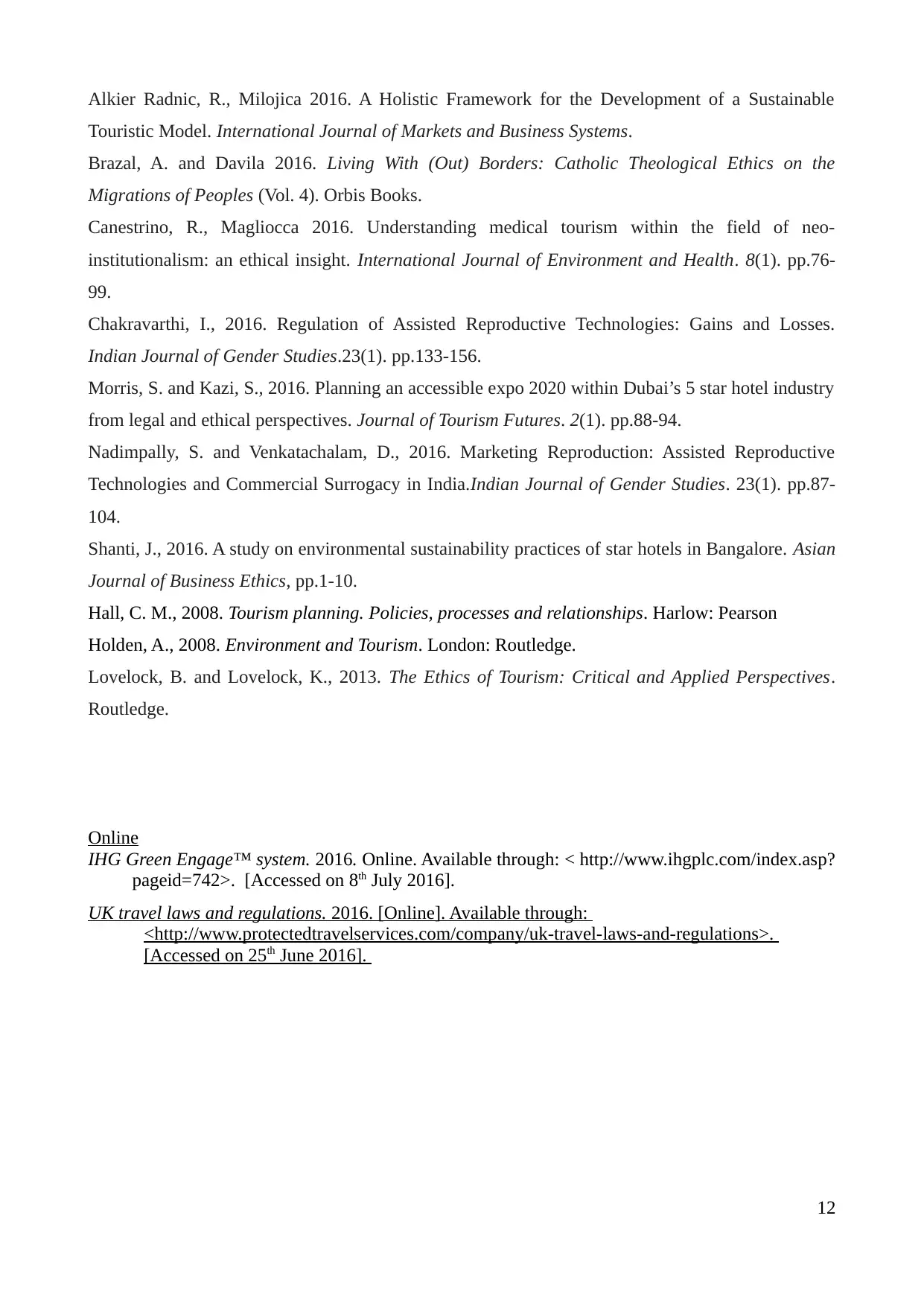
Alkier Radnic, R., Milojica 2016. A Holistic Framework for the Development of a Sustainable
Touristic Model. International Journal of Markets and Business Systems.
Brazal, A. and Davila 2016. Living With (Out) Borders: Catholic Theological Ethics on the
Migrations of Peoples (Vol. 4). Orbis Books.
Canestrino, R., Magliocca 2016. Understanding medical tourism within the field of neo-
institutionalism: an ethical insight. International Journal of Environment and Health. 8(1). pp.76-
99.
Chakravarthi, I., 2016. Regulation of Assisted Reproductive Technologies: Gains and Losses.
Indian Journal of Gender Studies.23(1). pp.133-156.
Morris, S. and Kazi, S., 2016. Planning an accessible expo 2020 within Dubai’s 5 star hotel industry
from legal and ethical perspectives. Journal of Tourism Futures. 2(1). pp.88-94.
Nadimpally, S. and Venkatachalam, D., 2016. Marketing Reproduction: Assisted Reproductive
Technologies and Commercial Surrogacy in India.Indian Journal of Gender Studies. 23(1). pp.87-
104.
Shanti, J., 2016. A study on environmental sustainability practices of star hotels in Bangalore. Asian
Journal of Business Ethics, pp.1-10.
Hall, C. M., 2008. Tourism planning. Policies, processes and relationships. Harlow: Pearson
Holden, A., 2008. Environment and Tourism. London: Routledge.
Lovelock, B. and Lovelock, K., 2013. The Ethics of Tourism: Critical and Applied Perspectives.
Routledge.
Online
IHG Green Engage™ system. 2016. Online. Available through: < http://www.ihgplc.com/index.asp?
pageid=742>. [Accessed on 8th July 2016].
UK travel laws and regulations. 2016. [Online]. Available through:
<http://www.protectedtravelservices.com/company/uk-travel-laws-and-regulations>.
[Accessed on 25th June 2016].
12
Touristic Model. International Journal of Markets and Business Systems.
Brazal, A. and Davila 2016. Living With (Out) Borders: Catholic Theological Ethics on the
Migrations of Peoples (Vol. 4). Orbis Books.
Canestrino, R., Magliocca 2016. Understanding medical tourism within the field of neo-
institutionalism: an ethical insight. International Journal of Environment and Health. 8(1). pp.76-
99.
Chakravarthi, I., 2016. Regulation of Assisted Reproductive Technologies: Gains and Losses.
Indian Journal of Gender Studies.23(1). pp.133-156.
Morris, S. and Kazi, S., 2016. Planning an accessible expo 2020 within Dubai’s 5 star hotel industry
from legal and ethical perspectives. Journal of Tourism Futures. 2(1). pp.88-94.
Nadimpally, S. and Venkatachalam, D., 2016. Marketing Reproduction: Assisted Reproductive
Technologies and Commercial Surrogacy in India.Indian Journal of Gender Studies. 23(1). pp.87-
104.
Shanti, J., 2016. A study on environmental sustainability practices of star hotels in Bangalore. Asian
Journal of Business Ethics, pp.1-10.
Hall, C. M., 2008. Tourism planning. Policies, processes and relationships. Harlow: Pearson
Holden, A., 2008. Environment and Tourism. London: Routledge.
Lovelock, B. and Lovelock, K., 2013. The Ethics of Tourism: Critical and Applied Perspectives.
Routledge.
Online
IHG Green Engage™ system. 2016. Online. Available through: < http://www.ihgplc.com/index.asp?
pageid=742>. [Accessed on 8th July 2016].
UK travel laws and regulations. 2016. [Online]. Available through:
<http://www.protectedtravelservices.com/company/uk-travel-laws-and-regulations>.
[Accessed on 25th June 2016].
12
⊘ This is a preview!⊘
Do you want full access?
Subscribe today to unlock all pages.

Trusted by 1+ million students worldwide
1 out of 13
Related Documents
Your All-in-One AI-Powered Toolkit for Academic Success.
+13062052269
info@desklib.com
Available 24*7 on WhatsApp / Email
![[object Object]](/_next/static/media/star-bottom.7253800d.svg)
Unlock your academic potential
Copyright © 2020–2026 A2Z Services. All Rights Reserved. Developed and managed by ZUCOL.




